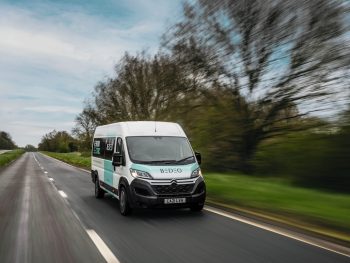A new white paper exposing “major government and policy gaps” in the UK electric vehicle retrofit market is now out.

UK engineering company Bedeo is calling for investment and regulation in the sector as it warns that support is “shockingly low” despite retrofitting being a proven solution to switch to cleaner powertrains.
Already popular and well subsidised in other European countries such as France, retrofitting describes the process of converting used ICE vehicles, including vans, to run on electric power.
Benefits can include extending the life of the vehicle and increasing its residual value. Additionally, this approach reduces the financial burden of buying a brand-new EV as well as the total cost of ownership while minimising environmental impact. It also retains rear-cargo fitouts – refrigerated units, custom sorting / stacking systems etc – that would otherwise be scrapped when the van was replaced with a new one.
Despite these benefits, Bedeo – formerly known as BD Auto – says the retrofit market is lacking in the UK, in a landscape “ripe for potential that presents a promising opportunity, ready for smart incentives and enhanced regulation”.
Based in Farnham, Hampshire, Bedeo offers brand-new fully electric light commercial vehicles (eLCV) developed and manufactured in-house to OEM production-approved standards.
But it also offers an advanced OEM-grade retrofit solution that fits to used ICE vehicles to make them either fully electric or hybrid through its Reborn Electric programmes.
Bedeo’s white paper says that by embracing retrofit solutions, the UK can mitigate the environmental impact of diesel vans and passenger cars, improve air quality, and accelerate progress towards a greener, more sustainable future.
A recent report from the Climate Change Committee (CCC) – the Government’s own eco advisers – warned that the UK was making “worryingly slow” progress towards its net zero goals.
Bedeo’s paper notes that with an average vehicle age of 8.4 years, many ICE vehicles registered in the UK by 2035 – when the ICE ban kicks in – will still be emitting greenhouse gases in the 2040s. And it highlights retrofitting as a cost-effective and quicker solution to help meet crucial decarbonisation deadlines.
CEO Osman Boyner, who founded the company in 2009, said: “Retrofit is going to be important in our [the UK’s] quest for not only a circular economy, but also to adopt electrification, and I’m surprised they [the UK government] aren’t doing more to support it – when you look at how popular Vinted and eBay are for fashion – why can’t we do that with cars and vans? Why do we have to just buy new?”
Boyner also warned that not only is the UK not investing in financial incentives for owners looking to retrofit their used cars, but it’s also not regulating the industry in terms of safety or best practice in quality standards.
He continued: “Electric retrofit deserves to have its own regulation, terms and conditions to meet before converting a vehicle and putting it on the road, for the sake of other drivers and occupants of the vehicles. As such, I don’t think electric retrofit is taken as seriously here in the UK, hence it being swept to the side in terms of not only safety but also subsidies. Retrofit is a missing link in the electrification roadmap, but to accelerate growth, the Government needs to support and regulate it correctly.”
The white paper concludes with a call to action for policymakers, industry stakeholders and fleet operators in the UK to prioritise investment in retrofit technologies.
Bedeo will also be submitting evidence for the call for evidence on ‘Registering historic, classic, rebuilt vehicles and vehicles converted to electric’ as officials review policies and processes relating to DVLA registrations for conversions.
The white paper, titled ‘Accelerating the Transition, Supporting our Businesses: Enabling Low-Emission Fleets with Retrofit Electrification’, is available to download here.

